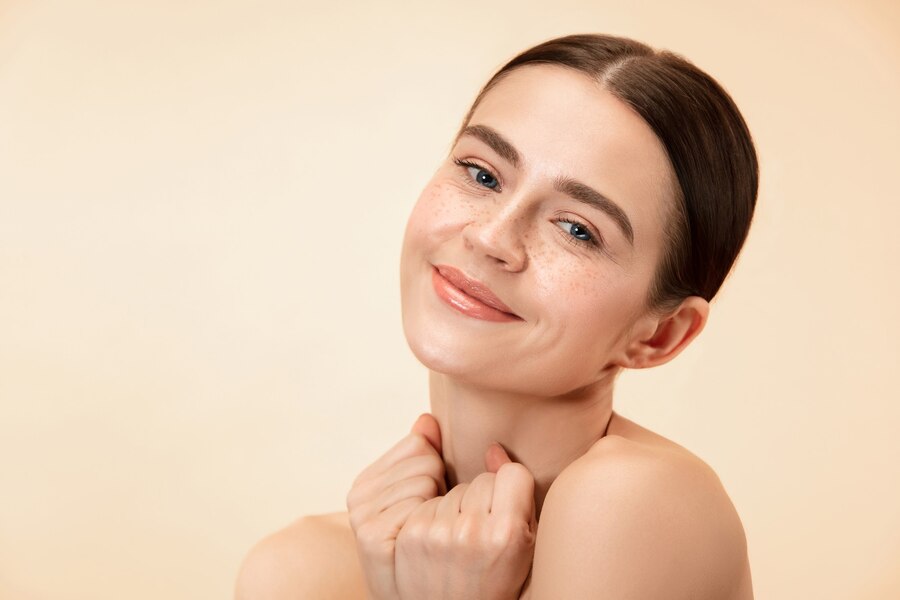How To Get Fair Skin: Myths And Facts About Skin Fairness
Many people desire a lighter complexion, believing it to enhance their attractiveness. It’s important to understand that skin colour is primarily determined by genetics, making it challenging to change skin colour permanently.
While it’s impossible to change one’s inherent skin colour through genetic means, certain conditions can lead to a desire to lighten specific areas of the skin. For instance, conditions like hyperpigmentation or uneven skin tone might lead one to seek ways to balance their skin’s appearance.
When it comes to achieving fairer skin, there are numerous myths and facts to consider. Some myths involve using potentially harmful chemicals or unverified home remedies that can adversely affect skin health.
The reality is that there’s no definite remedy for changing skin colour. However, one can use various healthy skincare practices to get a healthy and rejuvenated skin. Read on for more on how to get fair skin.
Can Dark Skin Become Fair Skin?
The shade of the skin is predominantly determined by genetics. Melanin, the same pigment that plays a role in skin colour, is a critical factor in determining the shade of our skin.
Unlike hair colour, which can be temporarily altered with dyes or bleaching, the colour of one’s skin remains unchanged. However, exposure to the sun or certain medical conditions can lead to variations in skin tone, such as darkening due to sun exposure or lightening due to skin disorders.
The societal controversies surrounding skin colour often revolve around harmful beauty standards prioritising lighter skin as more desirable or attractive. These ideals can perpetuate discrimination and bias against individuals with darker skin tones.
Nevertheless, people continue trying to determine how to become white through different practices.
Safe Methods to Get Fair Skin
Skin imperfections, including acne scars, melasma, freckles, and other hyperpigmentation, often lead individuals to seek quick solutions for achieving a more even and fair skin tone. These concerns can significantly impact self-esteem and confidence, driving people to explore various skin-lightening methods.
In addition to the imperfections, issues like age spots and post-inflammatory hyperpigmentation (PIH) are common. Age spots, also known as liver spots or sunspots, often appear as flat, brown spots on the skin, primarily in areas frequently exposed to the sun. On the other hand, PIH results from inflammatory skin conditions or trauma and can leave dark marks behind.
When addressing these skin imperfections, it’s vital to prioritise safe and effective approaches that target these issues and promote overall skin health. Here are some reliable methods:
Laser Treatment: Laser therapy is a widely used method to target hyperpigmentation, including age spots, PIH, and sunspots. It emits focused light energy absorbed by melanin in the skin, breaking down the dark-pigmented areas. Multiple sessions may be required in some locations where it takes longer for the skin to become fair.
Chemical Peels: This method involves a chemical solution applied to the skin to exfoliate its top layer. The process helps reduce pigmentation differences, improve skin texture, and promote even skin tone. Depending on the peel’s strength, it can address mild to moderate skin imperfections.
Microdermabrasion: This non-invasive procedure uses a mechanical device to gently exfoliate the skin’s surface. It helps remove dead skin cells, revealing a glowing and even complexion. While it is effective for mild to moderate hyperpigmentation, multiple sessions may be necessary to achieve noticeable results.
Glutathione Skin Whitening: Glutathione is a potent antioxidant that can be used for skin lightening. It is available in oral supplements or as intravenous injections. However, its effectiveness can vary from person to person, and it’s essential to consult a dermatologist before using glutathione for skin lightening.
Vitamins A and C: Topical products like creams or lotions containing vitamins A and C can help inhibit melanin production, making them helpful in fading dark spots and promoting even skin tone. Vitamin A, in the form of retinoids, encourages skin cell turnover. In contrast, vitamin C has antioxidant properties that protect the skin from further damage.
Arbutin: This is a natural extract obtained from bearberry plants. It works by inhibiting the effectiveness of an enzyme involved in melanin production. Arbutin is a gentle and safe ingredient often used in skincare products to gradually lighten dark spots and improve overall skin clarity.
When considering any of these methods, it is vital to consult a certified dermatologist or reputable skincare professional. They can assess specific skin concerns, recommend the most suitable approach, and provide guidance on post-treatment care and maintenance, thereby managing any potential side effects and adverse reactions.
What Probable Adverse Reactions Can These Methods Cause?
While these skin-lightening methods can effectively address hyperpigmentation and improve skin tone, it’s essential to be aware of potential side effects associated with these treatments. Understanding these side effects can help one make informed decisions and work closely with their dermatologist to manage and minimise risks.
Laser Treatment
Hyperpigmentation or Hypopigmentation: Laser treatment can occasionally lead to unintended changes in pigmentation. Hyperpigmentation refers to darkening of the skin, while hypopigmentation involves lightening. These changes may occur as the skin responds to the laser’s energy. One can reduce these risks through proper aftercare and sun protection.
Temporary Redness and Swelling: It’s common to experience redness and swelling immediately after a laser session. This is typically temporary and should subside within a few hours to a few days. Applying cold compresses and following post-treatment instructions can reduce the discomfort.
Scarring: Although rare, laser treatment carries a risk of scarring, especially in individuals with a history of keloids or poor wound healing. As such, one must be adequately evaluated to gauge the procedure’s suitability, helping minimise this risk.
Chemical Peels
Skin Sensitivity and Redness: After a chemical peel, the skin is likely to be sensitive and may appear reddened. This is a typical immediate reaction and usually subsides within a few days. Applying gentle skincare products and avoiding sun exposure during this time helps reduce the sensitivity.
Peeling and Crusting: Depending on the type and depth of the peel, the skin may start to peel or develop crusts. This is a part of the natural exfoliation process, and it’s essential not to pick or force the skin to peel because this leads to the development of scars.
Infection: There is a minimal risk of infection following a chemical peel, especially if post-treatment care instructions are not followed correctly. Therefore, maintaining proper hygiene and using prescribed medications can mitigate this risk.
Microdermabrasion
Temporary Redness and Swelling: Like laser treatment, microdermabrasion can cause temporary redness and swelling immediately after the procedure. These effects are usually mild and short-lived.
Dryness and Flaking: After microdermabrasion, the skin may become dry and flake as the dead skin cells are removed. This is a normal part of the exfoliation process, often managed with moisturisers and gentle skincare.
Skin Sensitivity: Some people may experience increased skin sensitivity following microdermabrasion. Avoiding harsh skincare products and sun exposure is essential until the skin has fully recovered.
Glutathione Skin Whitening
Stomach Upset: When taken orally, glutathione supplements can sometimes cause gastrointestinal side effects like bloating, diarrhoea, or abdominal discomfort. Adjusting the dosage or taking the supplement with food may help alleviate these symptoms.
Allergic Reactions: While rare, allergic reactions to glutathione supplements can occur. Symptoms may include itching, rash, swelling, or difficulty breathing. Anyone experiencing these symptoms should discontinue use and seek medical attention immediately.
Skin Rashes: In some cases, glutathione supplements have been associated with skin rashes. If skin irritation or rashes develop, it’s advisable to stop using the product and consult a dermatologist or other medical professional.
Topical Vitamins A & C
Skin Irritation: Vitamin A derivatives (retinoids) and vitamin C can cause skin irritation, especially when first introduced to a skincare routine. Redness, peeling, and dryness are common side effects. Starting with a lower concentration and gradually increasing use can help minimise irritation.
Sun Sensitivity: Both vitamin A and vitamin C can make the skin more sensitive to the sun. Therefore, using a broad-spectrum sunscreen daily is essential to prevent sunburn and further pigmentation issues.
Arbutin
Skin Irritation: While generally considered safe, arbutin may cause skin irritation or allergies in some people. Therefore, testing on a small skin patch before using arbutin-containing products all over the body is advisable. If irritation occurs, discontinue use.
Slow Progress: Arbutin is a mild skin-lightening agent, and its effects may take some time to become noticeable. Patience is essential, as quick results are unlikely.
It’s crucial to approach these treatments under the guidance of a qualified dermatologist who can assess your skin type, concerns, and any potential risk factors. Furthermore, one can opt for more restorative ways to keep the skin healthy, glowing and thriving over a long period.
What Methods Give Fair Skin Permanently?
Several people want to become fair quickly, but it’s vital to prioritise natural and healthy methods that maintain skin health and avoid potential risks associated with harsh chemicals or treatments. Here are some gentle and natural ways to lighten skin tone:
Eating Healthy
Maintaining a balanced diet isn’t just vital for your overall health; it can significantly contribute to achieving and maintaining healthy, radiant skin. Food plays a crucial role in nourishing the skin from the inside out. Here are some skin-friendly foods to incorporate into the daily diet:
Fruits and Vegetables: These nutrient-packed foods are rich in vitamins, minerals, and antioxidants. Vitamin C, found in citrus fruits like oranges and in leafy greens like spinach, can help make one become fair and improve skin texture. Beta-carotene in carrots and sweet potatoes supports healthy skin by providing natural sun protection.
Healthy Fats: Omega-3 fatty acids in fatty fish such as salmon, walnuts, flaxseeds, and chia seeds are essential for maintaining skin moisture and reducing inflammation. Including these healthy fats in the diet can lead to a more youthful complexion.
Protein: Protein is essential for building and repairing tissues, including your skin. Lean meats like chicken or turkey, legumes like beans and lentils, and plant-based protein sources like tofu supply the body with the amino acids necessary for collagen production. Collagen is a structural protein that promotes skin elasticity and firmness.
Using Sunscreen
Sunscreen is a vital part of a healthy skincare routine. It protects against harmful UV rays from the sun, preventing sunburn, premature ageing, and the risk of skin cancer. To protect the skin effectively, one should apply a broad-spectrum sunscreen with an SPF rating of 30 or higher every morning and even on cloudy days or during the winter months.
Hydrating
Proper hydration is essential for overall well-being and the health and appearance of one’s skin. Water helps to keep the skin adequately moisturised, allowing it to maintain its natural texture and appearance.
Staying well-hydrated supports the body’s natural detoxification processes, helping flush out toxins and impurities from one’s system. Aim to drink at least eight glasses of water daily to ensure the skin remains hydrated and glowing.
Detox/Cleansing
Regularly detoxifying or cleansing the skin can help remove impurities, unclog pores, and revitalise one’s complexion. Consider using gentle, natural products tailored to your skin type for effective cleansing. Harsh treatments should be avoided, as they can strip the skin of natural oils, leaving it dry and pale.
Getting Adequate Sleep
During deep sleep, the body goes into repair and rejuvenation mode. It produces collagen, repairs damaged cells, balances hormone levels, and decreases inflammation, all of which are crucial for maintaining healthy skin. Aim for 7-9 hours of restful sleep each night to allow your skin to regenerate, ensuring a refreshed and youthful appearance.
Fair And Healthy Skin with Labelle
Beautiful, unblemished and youthful-looking skin gives you plenty of self-esteem, allowing you to move through society full of confidence. Labelle understands this, offering healthy ways to revitalise your skin.
Contact Labelle for skin lightening treatment to make your skin glow again & get fair skin!
Note : Image by master1305 on Freepik
Get Free Consultation
